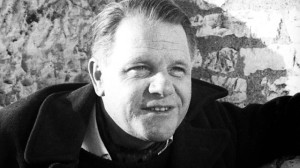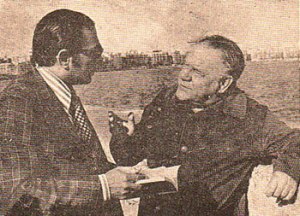I came across this rather nice review of ‘The Alexandria Quartet’ by the Pseudo Intellectual Reviews blog, who advocates this way of reading the novels:
The key to enjoying the work is simply to float with it – relax, don’t struggle and enjoy the prose poetry while waiting for Durrell’s coastguard to rescue you.
I found the review, with its call to enjoy the work and sort of immerse yourself in Durrell’s writing as if it were the Dead Sea, a refreshing antidote to the rash of trying-to-hard cynical “I can’t read Durrell because it’s too hard” pseudo-reviews that have erupted of late. This one, by the Spectator, is perhaps the worst. It asks a group of writers not to read something and comment on it, but to spew out a quick paragraph about the great works they “hate” plus a stunningly trite reason why. The result is an entire article that took zero thought and not much more time to create, a boon for the magazine’s editors no doubt, and one which appeals to readers by effectively saying ‘you will not have to think about anything you read for the next three minutes’.
In a depressing display of idiocy, Telegraph columnist Christopher Howse (who apparently “comments frequently and blogs on the uses and abuses of the English language”) says the following about Dostoevsky’s Crime and Punishment, which he has not actually read. (To do the research for this article, however, Howse went so far as to glance at the first page of a free edition on the internet, before his attention span ran out and he looked at some Lolcats instead):
I don’t know any Russian, and translations soon bring me up short. ‘I’ve learned to chatter this last month, lying for days together in my den thinking… of Jack the Giant-killer,’ says Raskolnikov on the first page. Did Dostoevsky mention Jack the Giant-killer, or was it some other tale, familiar in Russia? Would Dostoevsky really have expressed things in the language used? I stop reading and turn to something else.
Thanks for sharing your thoughts with us, Christopher. I know, reading is hard isn’t it? And Dostoevsky was a bit wordy, wasn’t he? And wasn’t he thoughtless to write in Russian instead of making the effort to write in English, which everyone who matters speaks. Of course, there’s only one translation of Crime and Punishment, too – the really ancient Constance Garnett one you referenced.
While Christopher seems to think that only English literature in English matters, and English speakers should not bother to learn other languages (too hard) or read foreign books in translation (pointless) I’ll just add that in the Russian original, Raskolnikov talks about Tsar Gorokh which is rather hard to translate into idiomatic English and actually it’s considered by some critics (like John Spiegel) an important reference to the lengthy psychogenesis of Raskolnikov’s decision to murder his landlady, since Tsar Gorokh is a synonym for the distant past. Whatever!
I wonder what Christopher turned to after giving up Dostoevsky after half a page? I would recommend “The Very Hungry Caterpillar” – not only is it written in English, it’s mercifully short and has lots of pictures to help you understand the story. Hurrah!
To return to Durrell, The Spectator has poet Jeremy Clarke dismissing The Alexandria Quartet as not worth it after he read the first sentence, which I suspect is all he bothered to read. You might as well learn a language instead, Clarke suggests – something that Howse would surely disagree with, if his attention didn’t wander before he had time to formulate that thought.
I wonder what language Clarke learned, perhaps it was Russian in which case he could help Howse understand Crime and Punishment, or maybe he wouldn’t be able to get past the first sentence.
Clarke goes on to say that readers can find out for themselves by going into a charity shop where, he says, they will find a copy of Justine (I think he was trying to be witty).
In response to the Spectator churnalism piece, Allan Massie wrote a blog in The Telegraph, in which he finally made the point that if you don’t like a classic book maybe it’s because you’re “not a good enough reader”, and that if we don’t like a classic book “the fault might lie within ourselves”, whatever that means.
I have no problem with anyone not liking a book, classic or not – I just think fluff like the Spectator piece is incredibly boring because by trying to sound clever and knowing in a single easy-to-read paragraph, none of the contributors gave any insight into their own personal literary tastes or experiences, plus I find these public displays of lauding laziness quite depressing.
Personally, for example, I dislike quite a lot of Dickens mostly because he represents the sort of nauseating Victorian English sentimental kitsch that I find annoying (‘A Christmas Carol’, anyone?) but specifically I hold a grudge against him because of his anti-Semitic portrait of Fagin in Oliver Twist and because of his armpit-torchingly embarrassing rendition of Stephen Blackpool’s Northern accent in Hard Times (and the fact that of course, Stephen, who knows his place, has perfectly pure morals).





